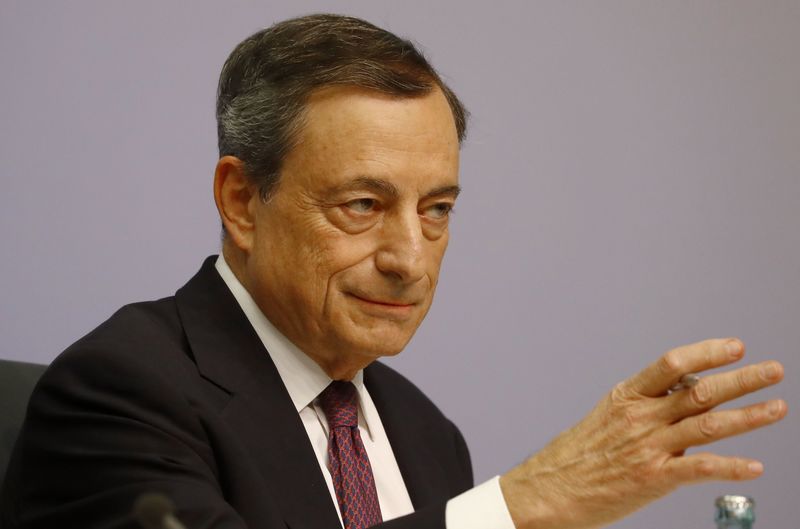 © Reuters. European Central Bank announces interest rate decision in Frankfurt
© Reuters. European Central Bank announces interest rate decision in FrankfurtBy Francesco Canepa
FRANKFURT (Reuters) – The European Central Bank said on Friday it was not up to it to publish the details of meetings President Mario Draghi holds with an exclusive club of financiers and economists, but described them as being in the public interest.
At issue is Draghi’s membership of the so-called Group of 30, where policymakers meet bankers, fund managers and academics behind closed doors to discuss economic issues.
He sits alongside former and current central bankers, such as Bank of England Governor Mark Carney and the Bank of Japan’s Haruhiko Kuroda, as well as Nobel laureate Paul Krugman.
Responding to a question from the European Union’s ombudsman, or transparency watchdog, the ECB said it was up to the group to decide whether to start publishing the content of its meetings.
“For G30 meetings, it is primarily for the G30 to decide on the level of transparency of its discussions,” it said in the response to one of 16 questions.
Ombudsman Emily O’Reilly had asked whether the ECB would “consider proactively informing the public of the content of these meetings, providing agendas and non-confidential summaries” of G30 events.
The ombudsman was responding to a complaint by activist group Corporate Europe Observatory, which said in January it was concerned about proximity at the G30 of ECB officials and bankers they are meant to supervise.
These include directors from Spain’s Santander (MC:), Germany’s Bayerische Landesbank and U.S. giant JPMorgan (N:), whose Luxembourg subsidiary is supervised by the ECB.
The chairman of UBS (S:), Axel Weber, and the chief executive of Credit Suisse (S:), Tidjane Thiam – two Swiss banks with several subsidiaries in the euro zone – are also members of the G30.
The ECB, which publishes the text of the speeches given by Draghi and other board members at the G30, said such meetings — which are announced in advance as taking place — were in the public interest because they helped inform its decisions on monetary policy.
“In an environment where proper safeguards are in place and respected, such interactions positively contribute to the ECB’s ability to fulfill its mandate – which, in turn, is in the public interest,” the ECB said.
It said the G30 had become more transparent since the complaint, filming and publishing one of its debates and allowing the media to a recent seminar.
In its response to O’Reilly, the ECB also announced plans to hold regular meetings with entrepreneurs outside the financial sector, a concession to critics who say it is too close to the industry it is supposed to oversee.
CEO, the activist group, said in a report last month that the vast majority of seats available on the ECB’s advisory groups were taken by financial sector representatives.
Draghi has been a member of the G30 since 2006, when he was still the governor of the Bank of Italy.
ECB Vice President Vitor Constancio and Sabine Lautenschlaeger, who represents the ECB’s supervisory arm on the board, have also spoken at G30 meetings.
ECB senior supervisor Julie Dickson contributed to a G30 paper on banking conduct, albeit only as an external observer.
Source: Investing.com





























